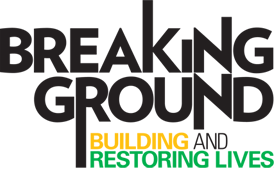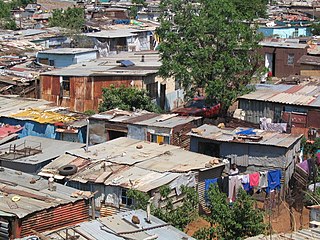
A slum is a highly populated urban residential area consisting of densely packed housing units of weak build quality and often associated with poverty. The infrastructure in slums is often deteriorated or incomplete, and they are primarily inhabited by impoverished people. Although slums are usually located in urban areas, in some countries they can be located in suburban areas where housing quality is low and living conditions are poor. While slums differ in size and other characteristics, most lack reliable sanitation services, supply of clean water, reliable electricity, law enforcement, and other basic services. Slum residences vary from shanty houses to professionally built dwellings which, because of poor-quality construction or lack of basic maintenance, have deteriorated.
Patricia Helen LaMarche is an American political figure and activist with the Green Party of the United States; she was the party's vice-presidential candidate in the 2004 United States presidential election, with David Cobb as its presidential candidate, and was one of seven co-chairs of the party’s national committee, and was elected to that position on July 24, 2005.
The United Nations Human Settlements Programme (UN-Habitat) is the United Nations programme for human settlements and sustainable urban development. It was established in 1977 as an outcome of the first United Nations Conference on Human Settlements and Sustainable Urban Development held in Vancouver, Canada, in 1976. UN-Habitat maintains its headquarters at the United Nations Office at Nairobi, Kenya. It is mandated by the United Nations General Assembly to promote socially and environmentally sustainable towns and cities with the goal of providing adequate shelter for all. It is a member of the United Nations Development Group. The mandate of UN-Habitat derives from the Habitat Agenda, adopted by the United Nations Conference on Human Settlements in Istanbul, Turkey, in 1996. The twin goals of the Habitat Agenda are adequate shelter for all and the development of sustainable human settlements in an urbanizing world.

Affordable housing is housing which is deemed affordable to those with a household income at or below the median as rated by the national government or a local government by a recognized housing affordability index. Most of the literature on affordable housing refers to mortgages and a number of forms that exist along a continuum – from emergency homeless shelters, to transitional housing, to non-market rental, to formal and informal rental, indigenous housing, and ending with affordable home ownership.
Slum upgrading is an integrated approach that aims to turn around downward trends in an area. These downward trends can be legal, physical (infrastructure), social or economic." The main objective of slum upgrading is to rehabilitate them into functional neighborhoods by addressing the social needs of the community, and improving integration into the formal urban economy.

Breaking Ground, formerly Common Ground, is a nonprofit social services organization in New York City whose goal is to create high-quality permanent and transitional housing for the homeless. Its philosophy holds that supportive housing costs substantially less than homeless shelters — and many times less than jail cells or hospital rooms, and that people with psychiatric and other problems can better manage them once they are permanently housed and provided with services. Since its founding in 1990 by Rosanne Haggerty, the organization has created more than 5,000 units of housing for the homeless. "This is about creating a small town, rather than just a building," according to Haggerty. "It's about a real mixed society, working with many different people." Haggerty left the organization in 2011 to found Community Solutions, Inc. Brenda Rosen was promoted from Director, Housing Operations and Programs to Executive Director, and has led the organization since.

Homelessness, also known as houselessness or being unhoused or unsheltered, is the condition of lacking stable, safe, and functional housing. The general category includes disparate situations, such as living on the streets, moving between temporary accommodation such as family or friends, living in boarding houses with no security of tenure, and people who leave their domiciles because of civil conflict and are refugees within their country.

The right to housing is the economic, social and cultural right to adequate housing and shelter. It is recognized in some national constitutions and in the Universal Declaration of Human Rights and International Covenant on Economic, Social and Cultural Rights. The right to housing is regarded as a freestanding right in the International human rights law which was clearly in the 1991 General Comment on Adequate Housing by the UN Committee on Economic, Social and Cultural Rights. The aspect of the right to housing under ICESCR include: availability of services, infrastructure, material and facilities; legal security of tenure; habitability; accessibility; affordability; location and cultural adequacy.

World Habitat Day is marked on the first Monday of October each year, and is recognized by the United Nations to reflect on the state of towns and cities, and on the basic right of all to adequate shelter. The day is also intended to remind the world that everyone has the power and the responsibility to shape the future of towns and cities. World Habitat Day was first celebrated in 1986 in Nairobi, Kenya, and the theme chosen for that year was "Shelter is My Right".
Picture the Homeless (PTH) is an American homeless person–led rights organization founded in 1999 by Lewis Haggins and Anthony Williams. It focuses on human rights, housing, police violence and other social justice issues. It was housed originally in Judson Memorial Church, which still hosts its Longest Night of the Year memorial event, and was located for a time in El Barrio and 2427 Morris Avenue in the Bronx. It is currently based at 104B E 126th Street in Manhattan.

Dolores Delahanty is a social activist and political leader in Louisville, Kentucky. She was a founding member of the National Women's Political Caucus during the early Civil Rights Movement, and she was critical to the success of Kentucky's Fair Credit Law. Delahanty has devoted her life to improving the lives of others, primarily those of Kentucky women and children.

The UN-Habitat Scroll of Honour Award was created by the United Nations Centre for Human Settlements (UNCHS) in 1989 to encourage and recognize the countries, governments, organizations, and individuals who have made great contributions to the development of housing. It is the most prestigious human settlements award in the world by the United Nations, given by the United Nations Human Settlements Programme (UN-Habitat), and has recognized 192 initiatives since its launch in 1989.
Wintringham, based in Victoria, Australia, is a secular, not-for-profit welfare company providing advocacy, support and aged care services to elderly homeless men and women, and to financially disadvantaged elderly people who are at risk of homelessness.

The St Mungo Community Housing Association, working as St Mungo's, is a charity registered in England to help homeless people.

The San Francisco Bay Area comprises nine northern California counties and contains five of the ten most expensive counties in the United States. Strong economic growth has created hundreds of thousands of new jobs, but coupled with severe restrictions on building new housing units, it has resulted in a statewide housing shortage which has driven rents to extremely high levels. The Sacramento Bee notes that large cities like San Francisco and Los Angeles both attribute their recent increases in homeless people to the housing shortage, with the result that homelessness in California overall has increased by 15% from 2015 to 2017. In September 2019, the Council of Economic Advisers released a report in which they stated that deregulation of the housing markets would reduce homelessness in some of the most constrained markets by estimates of 54% in San Francisco, 40 percent in Los Angeles, and 38 percent in San Diego, because rents would fall by 55 percent, 41 percent, and 39 percent respectively. In San Francisco, a minimum wage worker would have to work approximately 4.7 full-time jobs to be able to spend less than 30% of their income on renting a two-bedroom apartment.
Habitat III, the United Nations Conference on Housing and Sustainable Urban Development, took place in Quito, Ecuador, from 17 – 20 October 2016.

Informal housing or informal settlement can include any form of housing, shelter, or settlement which is illegal, falls outside of government control or regulation, or is not afforded protection by the state. As such, the informal housing industry is part of the informal sector.
Housing indicators are policy indicators designed to measure progress toward achieving housing policy goals. A housing indicator is a single, usually dimensionless number that points the way to improving housing outcomes. Because housing policy is heavily intertwined with other sectors such as social, economic, demographic and labour policy, and with the construction and finance industries, it requires a fairly comprehensive system of indicators to cover most of the key policies and issues. Housing indicator sets may contain political bias supporting the agendas or interests of those drawing up the system..











